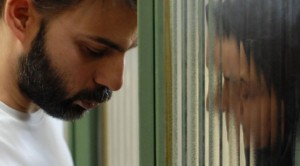Iranian Cinema: Defiance and Creativity in the Face of Authoritarianism
 A scene from A Separation (2011)
A scene from A Separation (2011) Journalist and Middle Eastern cultural expert Diana Darke once wrote, “In Iran, they say there are two books in every household—the Koran and Hafez. One is read, the other is not.” (For perspective, the fourteenth century Persian poet Hafez is nationally celebrated for his lyrical and satirical poetry, often criticized societal structures and religious doctrines, and influenced Western writers such as Thoreau, Goethe, and Emerson.) While I can’t be sure which tome is read and which isn’t, Hafez’s legacy of subversion persists in Iranian artists today, who, despite constraints or threats of censorship by the current regime for “insulting the sacred,” continue to use their art to critique social institutions and bring attention to government-endorsed injustice.
While there are many Persian-language and Iranian films that illuminate the culture and people of Iran for those of us who don’t live there, here are a few to start with that demonstrate the tenacity of progressive-minded Iranians and the vast disconnect between the judiciary and the citizenry.
The Stoning of Soraya M. is a 2008 drama directed by Cyrus Nowrasteh and based on the true story of Soraya Manutchehri, a woman stoned to death in a small village for “adultery” in 1986 because her husband reportedly wanted to marry a fourteen-year-old but did not want to have to support two wives. This movie is hard to watch at times, moving, and infuriating but has also faced criticism from Elise Auerbach of Amnesty International USA for being sensationalist and for misrepresenting contemporary Iran as an unenlightened society in need of Western intervention. So take heed.
A Separation is the 2011 Academy Award winner for Best Foreign Film and was directed by Ashgar Farhadi. Through the lens of a domestic drama involving two married couples (not a matter of infidelity—more complicated than that), this film explores religious/secular identities as they intersect with class indicators. For example, the way the hijab is worn very differently by the devout and the less devout characters in the movie, and the insinuation that rural and working class are more devout than the middle class and urban citizenry runs throughout—with ensuing implications. Watch this for a subtle depiction of politicized religious ideology in everyday life that demonstrates plurality within government-issued Islam.
No One Knows about Persian Cats is a mostly cheerful film from 2009 directed by Bahman Ghobadi that brings attention to Iran’s underground music scene and the hurdles that “illegal” indie rock, hip-hop, and other musicians must jump over to perform their secular music in secret without alerting the authorities. In Persian Cats, two aspiring musicians search for people to join their band as they try to make it out of the country to perform in Europe. Though many young artists are bursting with creativity, within the context of music specifically, they cannot perform because all lyrics and music must be reviewed by the Ministry of Culture and Islamic Guidance, which only approves 20 percent of incoming requests. Those who perform regardless and are caught face imprisonment. In most provinces, female artists either cannot perform at all or can only perform to a female audience.
Taxi is the latest film by Jafar Panahi and was released in the US earlier this month. It’s his third film after being convicted for “assembly and colluding with the intention to commit crimes against the country’s national security and propaganda against the Islamic Republic.” In previous films (most of them banned in Iran) like The Circle and Offside, Panahi exposed the plight of women under Iranian’s theocratic government. Though he’s been banned from filmmaking for twenty years, he has continued to do so in defiance of his sentence. (He has stated: “Nothing can prevent me from making films since when being pushed to the ultimate corners I connect with my inner-self and, in such private spaces, despite all limitations, the necessity to create becomes even more of an urge.”) Taxi explores the everyday life of Tehrani citizens through candid conversations between Jafar, the taxi driver, and fictionalized riders played by non-professional actors. These exchanges reveal the hypocrisy of using censorship to deny and render illegitimate harsher social realities in Iran, highlighting through others his own situation.
“The words you speak become the house you live in” is a saying attributed to Hafez. These filmmakers and Iranian artists of other mediums share in a long tradition of building the world they wish to live in. It’s time we watched and listened.
